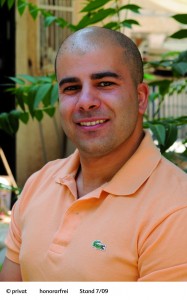 IDF spokesman cautious but optimistic on Iran
IDF spokesman cautious but optimistic on Iran
JVG: Your family is originally from Iran. How do you feel when Iran’s spiritual leader decries Israel as a ‘cancerous tumor’?
SHALICAR: It makes me sad and is horrible. Everybody knows that Iran has always had good relations with the Jews. In Biblical times the Persians liberated the Jews from Assyrian imprisonment. Until 1979, the Jewish communities in Iran lived in relative harmony with their environment. Now Iran threatens Israel’s very existence.
What are the real confl icts between Israel and Iran?
There are none. Until 1948 there was also no real confl ict between Israel and Egypt. Nevertheless, Egypt attacked Israel and, in 1967, threatened to destroy it. Today not only Israel, but many moderate Arab regimes and Western democracies are threatened by Al Qaida, the Hezbollah, Hamas and the Islamic Jihad. Iran uses the same ‘language’ as these terrorist organizations.
What chances do you give a diplomatic solution?
We Israelis want to give diplomacy a chance. But if a diplomatic solution and sanctions do not work, other measures have to be taken into consideration. These measures don’t have to mean war. Also, keeping and reinforcing sanctions should be given a chance.
Do you hope for a peaceful solution to the confl ict with Iran?
Yes. As a Jew and Israeli. According to Jewish faith, our people has the task of improving the world. Israel is developing high-tech which the whole world uses. We are building a humane society and we’ve taken in a few million immigrants and succeeded in making Israel their old-new home. Hope for reconciliation with our neighbors remains.
What about the “Arab spring”?
There are forces for freedom and liberal societies in the Islamic world, but there is also hate, extremism and aggression towards Israel. We must hope for the best, but we must be prepared for the worst.
Arye Sharuz Shalicar is one of the press spokesmen of the Israeli army.
His book “A wet dog is better than a dry Jew” (dtv) about his youth in Berlin was a bestseller in Germany.
ISBN 978-3-423-40240-8
